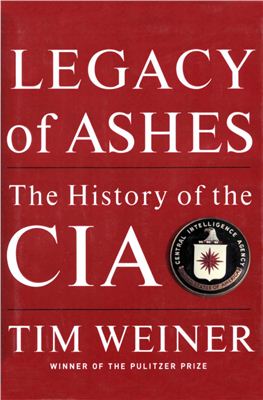Publisher: Doubleday; 1St Edition edition (June 28, 2007).
Language: English.
735 pages.
Is the Central Intelligence Agency a bulwark of freedom against dangerous foes, or a malevolent conspiracy to spread American imperialism? A little of both, according to this absorbing study, but, the author concludes, it is mainly a reservoir of incompetence and delusions that serves no one's interests well. Pulitzer Prize–winning New York Times correspondent Weiner musters extensive archival research and interviews with top-ranking insiders, including former CIA chiefs Richard Helms and Stansfield Tuer, to present the agency's saga as an exercise in trying to change the world without bothering to understand it. Hypnotized by covert action and pressured by presidents, the CIA, he claims, wasted its resources fomenting coups, assassinations and insurgencies, rigging foreign elections and bribing political leaders, while its rare successes inspired fiascoes like the Bay of Pigs and the Iran-Contra affair. Meanwhile, Weiner contends, its proper function of gathering accurate intelligence languished. With its operations easily penetrated by enemy spies, the CIA was blind to events in adversarial countries like Russia, Cuba and Iraq and tragically wrong about the crucial developments under its purview, from the Iranian revolution and the fall of communism to the absence of Iraqi WMDs. Many of the misadventures Weiner covers, at times sketchily, are familiar, but his comprehensive survey brings out the persistent problems that plague the agency. The result is a credible and damning indictment of American intelligence policy.
Language: English.
735 pages.
Is the Central Intelligence Agency a bulwark of freedom against dangerous foes, or a malevolent conspiracy to spread American imperialism? A little of both, according to this absorbing study, but, the author concludes, it is mainly a reservoir of incompetence and delusions that serves no one's interests well. Pulitzer Prize–winning New York Times correspondent Weiner musters extensive archival research and interviews with top-ranking insiders, including former CIA chiefs Richard Helms and Stansfield Tuer, to present the agency's saga as an exercise in trying to change the world without bothering to understand it. Hypnotized by covert action and pressured by presidents, the CIA, he claims, wasted its resources fomenting coups, assassinations and insurgencies, rigging foreign elections and bribing political leaders, while its rare successes inspired fiascoes like the Bay of Pigs and the Iran-Contra affair. Meanwhile, Weiner contends, its proper function of gathering accurate intelligence languished. With its operations easily penetrated by enemy spies, the CIA was blind to events in adversarial countries like Russia, Cuba and Iraq and tragically wrong about the crucial developments under its purview, from the Iranian revolution and the fall of communism to the absence of Iraqi WMDs. Many of the misadventures Weiner covers, at times sketchily, are familiar, but his comprehensive survey brings out the persistent problems that plague the agency. The result is a credible and damning indictment of American intelligence policy.

